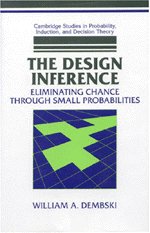
Intelligent design (ID) is a pseudoscientific argument for the existence of God, presented by its proponents as "an evidence-based scientific theory about life's origins". Proponents claim that "certain features of the universe and of living things are best explained by an intelligent cause, not an undirected process such as natural selection." ID is a form of creationism that lacks empirical support and offers no testable or tenable hypotheses, and is therefore not science. The leading proponents of ID are associated with the Discovery Institute, a Christian, politically conservative think tank based in the United States.

Irreducible complexity (IC) is the argument that certain biological systems cannot have evolved by successive small modifications to pre-existing functional systems through natural selection, because no less complex system would function. Irreducible complexity has become central to the creationist concept of intelligent design, but the scientific community regards intelligent design as pseudoscience and rejects the concept of irreducible complexity. Irreducible complexity is one of two main arguments used by intelligent-design proponents, alongside specified complexity.

William Albert Dembski is an American mathematician, philosopher and theologian. He was a prominent proponent of intelligent design (ID) pseudoscience, specifically the concept of specified complexity, and was a senior fellow of the Discovery Institute's Center for Science and Culture (CSC). On September 23, 2016 he officially retired from intelligent design, resigning all his "formal associations with the ID community, including [his] Discovery Institute fellowship of 20 years". A February 2021 interview in the CSC's blog Evolution News announced "his return to the intelligent design arena".
John Corrigan "Jonathan" Wells is an American author, theologian, and advocate of the pseudoscientific argument of intelligent design. Wells joined the Unification Church in 1974, and subsequently wrote that the teachings of church founder Sun Myung Moon, his own studies at the Unification Theological Seminary and his prayers convinced him to devote his life to "destroying Darwinism." The term Darwinism is often used by intelligent design proponents and other creationists to refer to the scientific consensus on evolution. He gained a PhD in religious studies at Yale University in 1986, then became Director of the Unification Church's inter-religious outreach organization in New York City. In 1989, he studied at the University of California, Berkeley, where he earned a PhD in molecular and cellular biology in 1994. He became a member of several scientific associations and has published in academic journals.
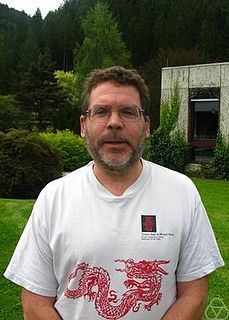
Jeffrey Outlaw Shallit is a computer scientist, number theorist, and a noted critic of intelligent design. He is married to Anna Lubiw, also a computer scientist.

Specified complexity is a creationist argument introduced by William Dembski, used by advocates to promote intelligent design. According to Dembski, the concept can formalize a property that singles out patterns that are both specified and complex, where in Dembski's terminology, a specified pattern is one that admits short descriptions, whereas a complex pattern is one that is unlikely to occur by chance. Proponents of intelligent design use specified complexity as one of their two main arguments, alongside irreducible complexity.

Darwin on Trial is a 1991 book by law professor Phillip E. Johnson disputing tenets of science and evolution and promoting creationism. Johnson wrote the book with the thesis that evolution could be "tried" like a defendant in court. Darwin on Trial became a central text of the intelligent design movement, and Johnson has been described as the "father of ID".

Intelligent Design: The Bridge Between Science and Theology is a 1999 book by the mathematician William A. Dembski, in which the author presents an argument in support of intelligent design. Dembski defines the term "specified complexity", and argues that instances of it in nature cannot be explained by Darwinian evolution, but instead are consistent with the intelligent design. He also derives an instance of his self-declared law of conservation of information and uses it to argue against Darwinian evolution. The book is a summary treatment of the mathematical theory he presents in The Design Inference (1998), and is intended to be largely understandable by a nontechnical audience. Dembski also provides a Christian theological commentary, and analysis of, what he perceives to be the historical and cultural significance of the ideas.
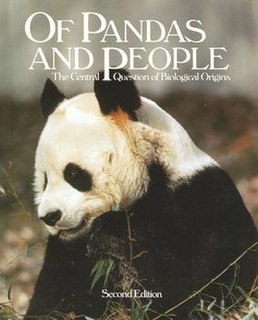
Of Pandas and People: The Central Question of Biological Origins is a controversial 1989 school-level textbook written by Percival Davis and Dean H. Kenyon, edited by Charles Thaxton and published by the Texas-based Foundation for Thought and Ethics (FTE). The textbook endorses the pseudoscientific concept of intelligent design – the argument that life shows evidence of being designed by an intelligent agent which is not named specifically in the book, although proponents understand that it refers to the Christian God. The overview chapter was written by young Earth creationist Nancy Pearcey. They present various polemical arguments against the scientific theory of evolution. Before publication, early drafts used cognates of "creationist". After the Edwards v. Aguillard Supreme Court ruling that creationism is religion and not science, these were changed to refer to "intelligent design". The second edition published in 1993 included a contribution written by Michael Behe.

An intelligent designer, also referred to as an intelligent agent, is the hypothetical willed and self-aware entity that the intelligent design movement argues had some role in the origin and/or development of life. The term "intelligent cause" is also used, implying their teleological supposition of direction and purpose in features of the universe and of living things.

Massimo Pigliucci is Professor of Philosophy at the City College of New York, former co-host of the Rationally Speaking Podcast, and former editor in chief for the online magazine Scientia Salon. He is a critic of pseudoscience and creationism, and an advocate for secularism and science education.
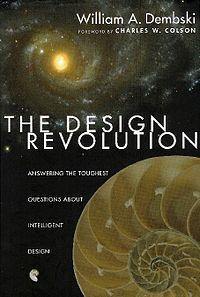
The Design Revolution: Answering the Toughest Questions about Intelligent Design is a 2004 book by William A. Dembski, who supports intelligent design, and the idea that certain features of the universe and of living things are best explained by an intelligent cause, not a naturalistic process such as natural selection. The book is written in question/answer format from Dembski's point of view as one of the conceptual leaders in the movement. Each chapter is about 4 pages long and addresses one specific question. Dembski describes these questions as from his prior ten years experience in lectures, media interviews, and published criticism by the scientific community opposed to intelligent design, who constitute the majority of the scientific community and science education organizations. The foreword was written by Charles W. Colson.
![Universal probability bound Notion in [[intelligent design]]](https://upload.wikimedia.org/wikipedia/commons/thumb/4/45/Watch_with_no_background.png/320px-Watch_with_no_background.png)
A universal probability bound is a probabilistic threshold whose existence is asserted by William A. Dembski and is used by him in his works promoting intelligent design. It is defined as
A degree of improbability below which a specified event of that probability cannot reasonably be attributed to chance regardless of whatever probabilitistic resources from the known universe are factored in.

Wesley Royce Elsberry is a data scientist with an interdisciplinary background in marine biology, zoology, computer science, and wildlife and fisheries sciences. He also became notably involved in the defense of evolutionary science against creationist rejection of evolution.

Neo-creationism is a pseudoscientific movement which aims to restate creationism in terms more likely to be well received by the public, by policy makers, by educators and by the scientific community. It aims to re-frame the debate over the origins of life in non-religious terms and without appeals to scripture. This comes in response to the 1987 ruling by the United States Supreme Court in Edwards v. Aguillard that creationism is an inherently religious concept and that advocating it as correct or accurate in public-school curricula violates the Establishment Clause of the First Amendment.

Darwinism, Design and Public Education is a 2003 anthology, consisting largely of rewritten versions of essays from a 1998 issue of Michigan State University Press's journal, Rhetoric and Public Affairs, edited by intelligent design activists John Angus Campbell and Stephen C. Meyer, neither of whom are scientists. The book is promoted as being a "peer-reviewed science book", however in reviewing it Barbara Forrest notes that:
Nineteen of the twenty-seven essays are by ID creationists and their supporters, not one of whom is a working evolutionary biologist. Among the eight pro-evolution essays, only four are by scientists. Of those, only two are by evolutionary biologists. There is a preponderance of humanities scholars; some, like rhetorician John Angus Campbell, are ID proponents while others are pro-evolution.

The Discovery Institute has conducted a series of related public relations campaigns which seek to promote intelligent design while attempting to discredit evolutionary biology, which the Institute terms "Darwinism." The Discovery Institute promotes the pseudoscientific intelligent design movement and is represented by Creative Response Concepts, a public relations firm.
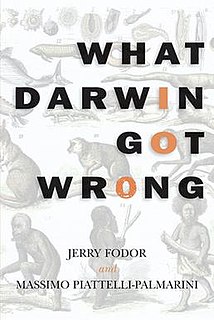
What Darwin Got Wrong is a 2010 book by philosopher Jerry Fodor and cognitive scientist Massimo Piattelli-Palmarini, in which the authors criticize Charles Darwin's theory of natural selection. It is an extension of an argument first presented as "Why Pigs Don't Have Wings" in the London Review of Books.

The relationship between intelligent design and science has been a contentious one. Intelligent design (ID) is presented by its proponents as science and claims to offer an alternative to evolution. The Discovery Institute, a politically conservative think tank and the leading proponent of intelligent design, launched a campaign entitled "Teach the Controversy" which claims that a controversy exists within the scientific community over evolution. The scientific community, however, rejects intelligent design as a form of creationism. The basic facts of evolution are not a matter of controversy in science.
